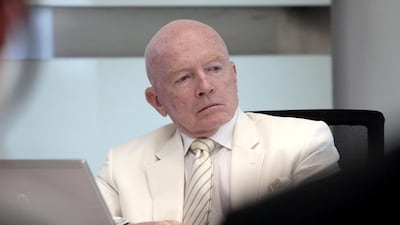Franklin Templeton investments, a global fund management firm, may increase its Saudi Arabian equities exposure to as much as US$1.16 billion, about 4 per cent of its $29bn global emerging markets portfolio, as the biggest Arab economy continues to liberalise its capital market.
"We are now at about 1 or 2 per cent of our total global portfolios in Saudi and we can easily increase it to 3 or 4 per cent," Mark Mobius, the executive chairman of Templeton Emerging Markets Group said in Dubai yesterday. "We can easily double that under the right conditions. There's a good chance we will do something more there."
The Capital Market Authority, overseer of the Saudi Stock Exchange (Tadawul), which has more than $450bn in market capitalisation, is liberalising the equities market and introducing structural and regulatory reforms such as changes in the settlement procedures and relaxing restrictions on foreign qualified investors.
_____________
Read more:
Saudi Arabia left out of FTSE Russell emerging markets index, Kuwait upgraded
Aramco on track for IPO, says Saudi energy minister
_____________
Index provider FTSE Russell last week said it will reassess Saudi Arabia in March for inclusion in its emerging market gauge, which may attract investment flows in access of $4bn.
The MSCI, whose emerging markets index, according to media reports, is tracked by about $2 trillion in active and passive funds, will announce its decision on including Saudi Arabia in the index in June 2018. If successful, dozens of stocks in the kingdom would become part of the emerging market gauge.
"Saudi Arabia will be a big game changer," said Mr Mobius, who is bullish on the pace of Saudi market reforms. "There's no question about it. With the new liberalised regime, there's a tremendous hope that things will move a lot faster than they have up to now."
The market, the biggest in the Arab world, has come a long way, but there is still work to be done, he added. Changes to foreign exchange controls and further easing of ownership restrictions are needed for more investments, added Mr Mobius.
"In fact, if Saudi Arabia really liberalises to the extent that they plan [to liberalise], we will be willing to put more money [into the market]," he said.
"At the end of the day we are running an open-ended fund and we have to be able to get money in and out, which is why we use the brokerage system to guarantee us to get out when we needed to. I think that would be the key," Mr Mobius noted.
Easing of restrictions, he said, will ultimately work in favour of Saudi Arabia, when weighed against markets such as Iran, which is almost equal in size to Tadawul.
"The degree to which Saudis have moved ahead, they will be in a much better position vis-a-vis Iran," Mr Mobius said, adding that investors have looked at the investment openings in Iran which have not come about and Saudi Arabia has the chance to "steel Iran's thunder" in terms of garnering investor attention.
Although the slump in oil prices from the mid-2014 peak of $115 per barrel has slowed the GCC's hydrocarbon-dependent economies, and geo-political uncertainties have pushed investors on the side of caution, Mr Mobius said, Franklin's investment decisions are based on the fundamentals of the companies and there are "some terrific companies," in Saudi Arabia.
The listing of Saudi Aramco, which can significantly change Saudi Arabia's weighting in the emerging market gauge, and the kingdom's plans to unlock value in other state-controlled assets would be the key to market balance going forward, Mr Mobius noted.
"One of the reasons why the other listings of the government entities are so important is that it will balance out this huge Aramco issue [IPO]. A lot of people will say Saudi market is just Aramco and nothing else and you don't want that. You want balance [in the market]," he said.
Saudi Arabia, which relies heavily on the sale of hydrocarbons for revenue, plans to privatise some government-owned entities as part of its Vision 2030 economic diversification programme.
Riyadh is looking to sell about 5 per cent of Aramco, the world's top oil producer, via an initial public offering (IPO) which may raise as much as $100bn, possibly the biggest-ever share sale globally.
The IPO is on track Aramco said in a statement to The National last month and the government is "moving right ahead" in the second half of next year, Bloomberg quoted Saudi Oil Minister Khalid Al-Falih as saying in Moscow. "There is nothing to indicate that schedule is slipping in any way."


